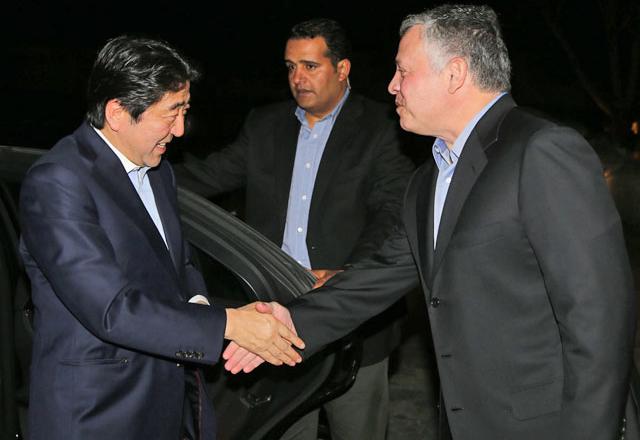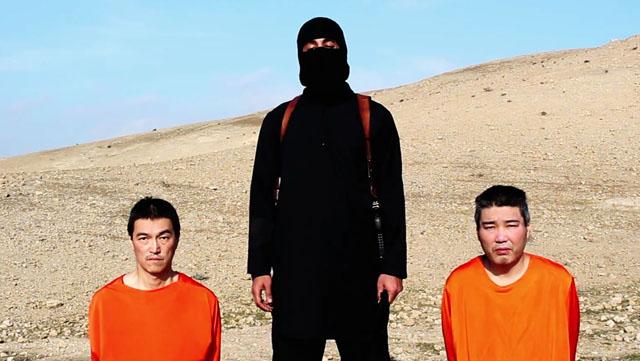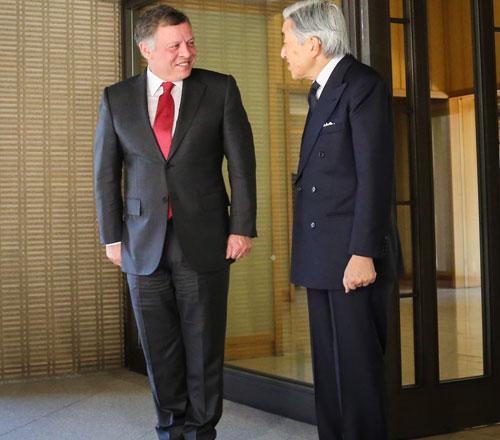You are here
Japan pursues ‘proactive, non-military’ engagement as regional threats mount
By Khetam Malkawi - Jan 17,2015 - Last updated at Jan 17,2015

AMMAN — Japanese Prime Minister Shinzo Abe arrived in Jordan Saturday and is due to hold talks with His Majesty King Abdullah and Prime Minister Abdullah Ensour Sunday.
According to Abe and a senior Japanese official, bilateral ties, the fight against terrorism and regional challenges will top the agendas of the visiting premier’s meetings in Amman.
On Saturday, Their Majesties King Abdullah and Queen Rania hosted a dinner in honour of Abe and the accompanying delegation, which includes an array of top officials and leading businessmen.
Abe has said in an interview that Japan plans to continue its non-military assistance to the region as part of its “proactive contribution to peace”, announcing financial aid of around $2.7 billion to Middle East countries, including Jordan (see separate story).
In an interview with The Jordan Times, a senior Japanese official said her country would continue to work with the countries of the region to achieve a sustainable peace in the region and push forward for a two-state solution that Jordan is also calling for.
Takako Ito, assistant secretary director at the Japanese prime ministry’s international press division, said: “We are concerned about the situation that since last summer [the peace process] has not been moving forward.”
Thus, she added, Japan’s basic position is to realise the two-state solution and that Israel has to withdraw from the territories occupied in 1967.
Japan would like to work with countries in the region as well as the international community to achieve peace.
“We see Jordan as having a very important role as a regional actor, particularly now as Jordan is a member of the United Nations Security Council, so our cooperation and partnership with Jordan is something that we would like to continue.”
In terms of Japan’s contribution to the peace process, Ito, who is accompanying the visiting PM, said Japan would like to have political work with related countries and partners.
Regarding Abe’s regional visit, which has taken him to Egypt and will also include Palestine and Israel, Ito said: “This time… our prime minister will talk directly to the Palestinian president as well as the prime minister of Israel… We would like to send a message to both of them not to take unilateral acts that would make the situation worse, and that they have to resume direct talks.”
One of the measures that Japan is supporting to help make sustainable peace in the region, according to the official, is the Corridor of Peace and Prosperity, a medium- to long-term solution aimed at confidence building as well as stable development among the people of the Jordan Valley, “so we would like to have economic development in cooperation with concerned members — Japan, Jordan, Palestine and Israel”.
The Agri-Industrial Park in the Jordan Valley is one example of this peace corridor.
“We provide the money and the technical assistance to continue to develop this agri-industrial park… hopefully in the future we will have products and export them to the region,” she noted, adding that the project started eight years ago, and is still progressing. “The prime minister will visit the site of the project,” she announced.
The visit of the Japanese premier also has economic importance as he is accompanied by 20 businessmen who are interested in investing in the Kingdom, according to the official, who said: “There is a lot of interest in doing business in Jordan especially in the energy sector… and Jordan has been an important source of Japan’s imports of fertilisers,” Ito explained.
As for assistance to Jordan, she noted that last year her country provided about $100 million in financial assistance to the government.
On January 9, the Japanese Cabinet endorsed additional $27 million for Jordan to deal with the impact of the Syrian refugees crisis through international organisations — UNHCR, WFP and UNICEF.
Tokyo has also set aside $400,000 to assist the Kingdom in capacity building targeting local anti-terrorism agencies.
As for tourism, Japan will support the construction of Petra Museum, and the two countries will be exchanging football coaches.
Since taking office in December 2012, Abe has worked to boost Japan’s profile in global affairs, according to Agence France-Presse, which added that the last time a Japanese leader visited Jordan, Israel and the Palestinian territories was in 2006 when Junichiro Koizumi was in office.
Related Articles
Visiting Japanese Prime Minister Shinzo Abe has urged Middle East countries to unite in their fight against terrorism and efforts to address other regional challenges, vowing that his country would pursue its policy of “proactive contribution to peace”.
Japan has set up an operations room in Jordan to deal with the issue of two Japanese citizens held captive by the Islamic State (IS) terror group, an official at the Japanese embassy in Amman said Thursday.
His Majesty King Abdullah on Saturday arrived home from a four-day working visit to Japan that started Tuesday, during which he met with Emperor Akihito, Prime Minister Shinzo Abe and other senior officials and top corporate executives.













